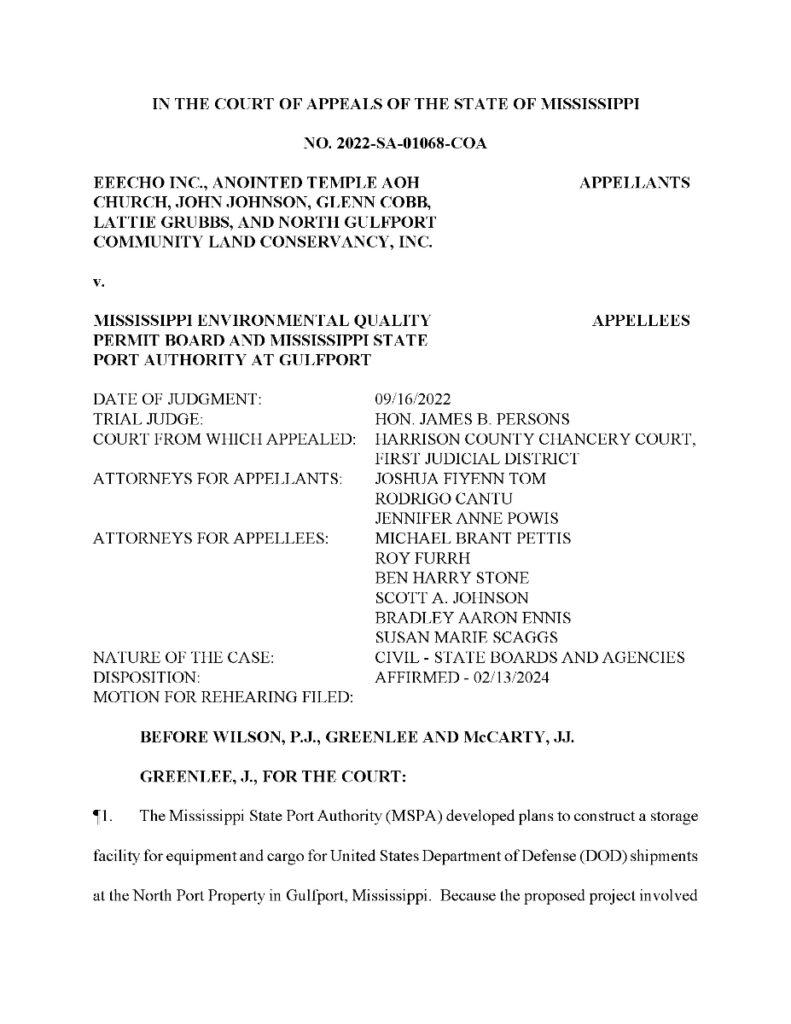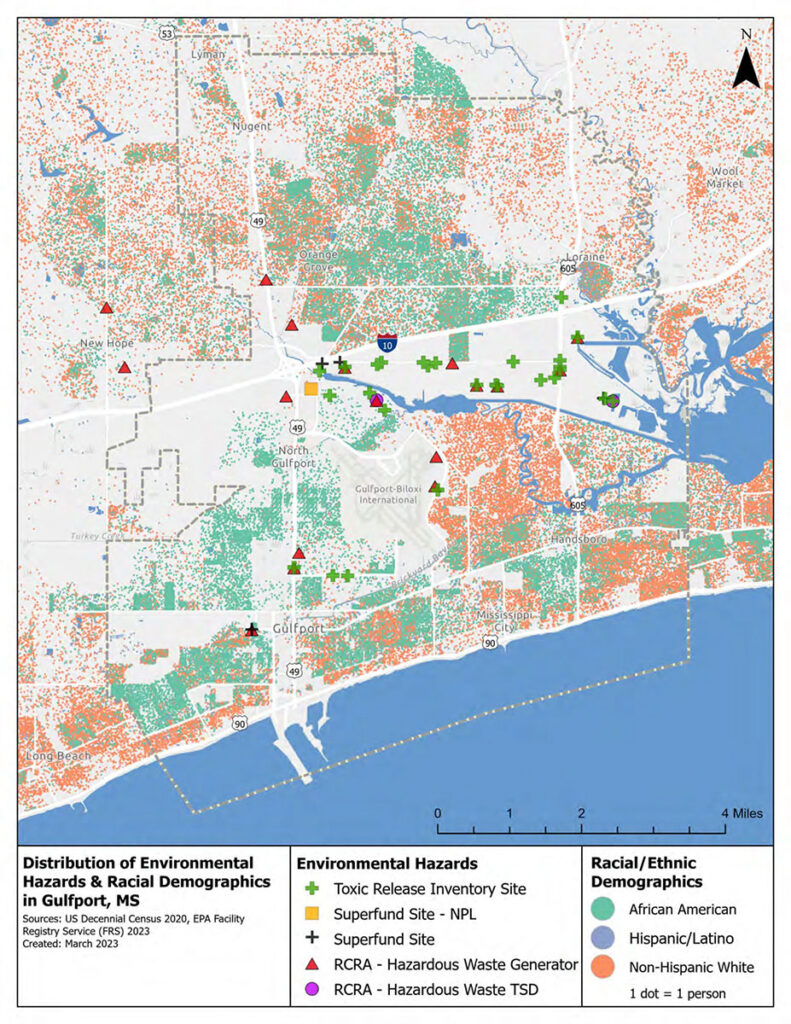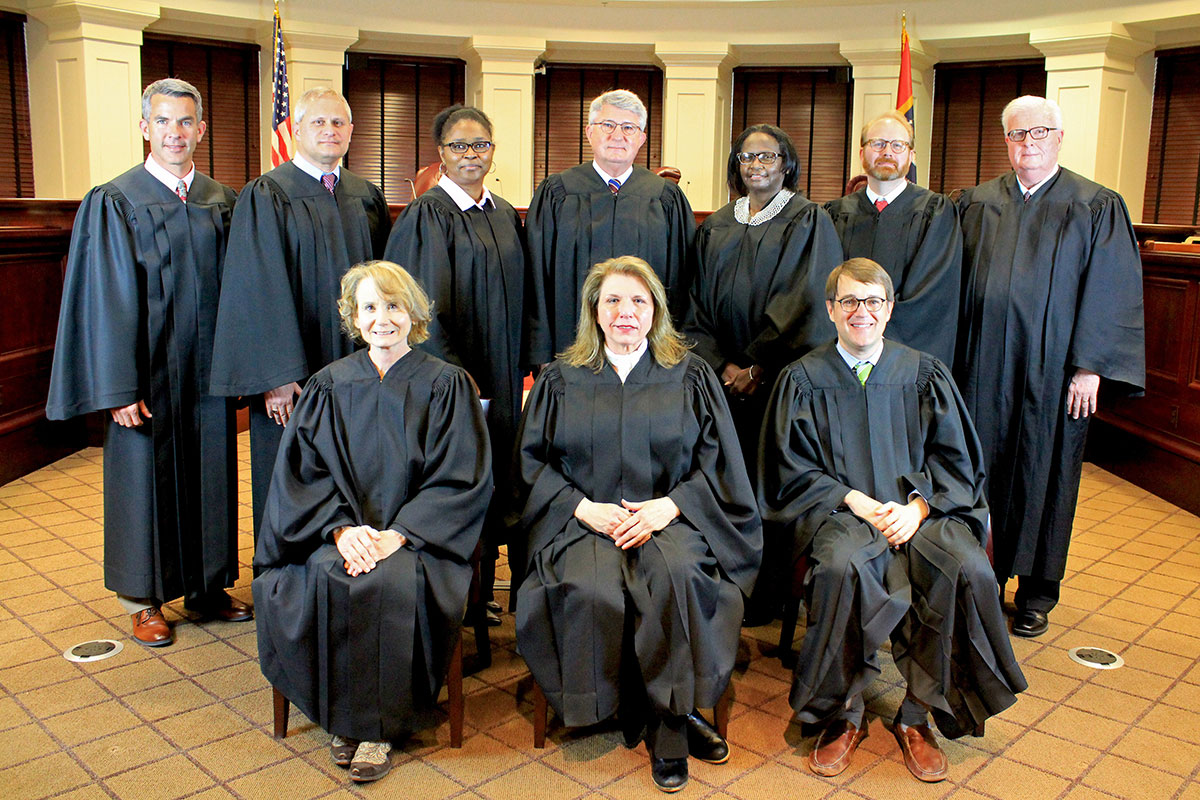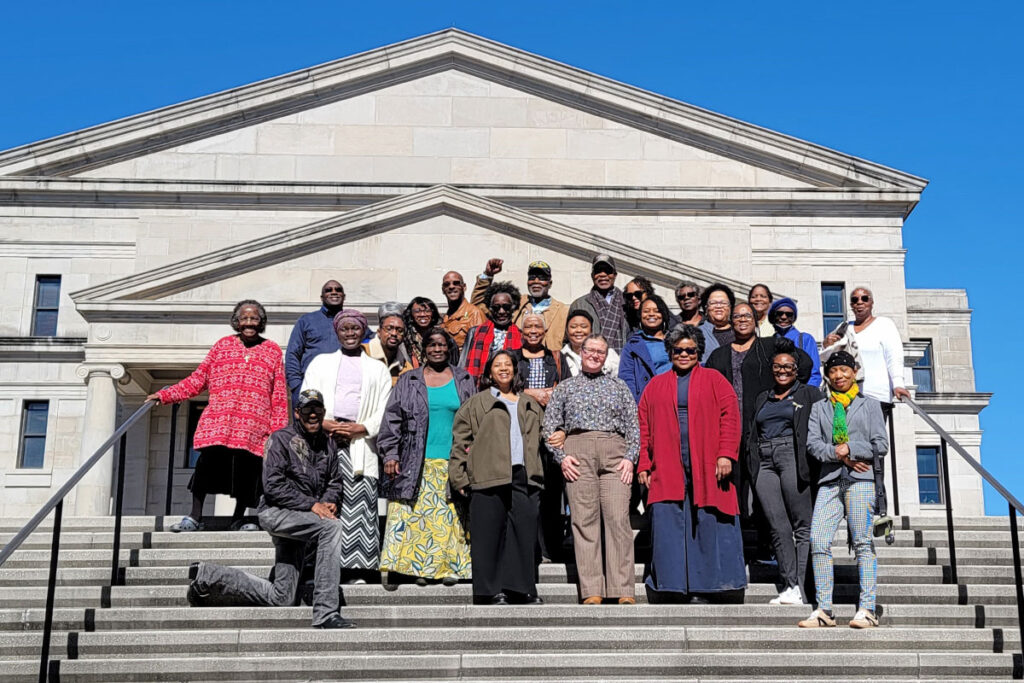The Mississippi Port Authority can build a U.S. Department of Defense storage building that could contain explosive ammunition in the historically Black communities of Turkey Creek and Forest Heights, the Mississippi Court of Appeals ruled this month. Residents are considering appealing the case to the Mississippi Supreme Court.
“This community from the very beginning, so going back years, has been saying that they’re an environmental justice community. It’s a community that has not received the attention it needs, and this is just one more example of how the state is expecting their community to bear an outside burden, like the siting of a Department of Defense facility,” Earthjustice Gulf Regional Office Senior Attorney Rodrigo Cantú told the Mississippi Free Press on Feb. 15, a day after the ruling.
Thirteen miles of Turkey Creek connect the historic communities of Turkey Creek and Forest Heights in Gulfport, Miss., where formerly enslaved Africans bought and settled the 320 acres of Turkey Creek in 1866.
Residents in the communities have long opposed developing the area and previously challenged the Mississippi Port Authority when it wanted to put commercial poultry freezers on the former fertilizer plant site after Hurricane Katrina wrecked its chicken export business.

The Mississippi Environmental Quality Permit Board granted a water-quality certification to the State Port Authority at Gulfport to build a storage facility for cargo and equipment in the North Port Property of Gulfport in 2019.
The plaintiffs in the case are EEECHO, Inc.; Anointed Temple AOH Church; John Johnson; Glenn Cobb; Lattie Grubbs; and North Gulfport Community Land Conservancy, Inc. They first challenged the decision in the Harrison County Chancery Court, which affirmed the port authority’s and permit board’s decision, and then appealed to the Court of Appeals.
North Port Is ‘In Their Community’
Rodrigo Cantú said the permit board failed to look at the water-quality criteria when assessing the site and did not consider the consequences of storing explosives in a historically Black residential area near Turkey Creek.
“Our concern is about the nearby Turkey Creek, which is already a compromised fluvial body that might take in more contamination if there’s a leak or explosion or some other release of chemicals from this site is going to further impair that body of water,” he told the Mississippi Free Press.
If Turkey Creek floods, Cantú said it could bring toxic wastewater into people’s homes and the local community. American Civil Liberties Union of Mississippi Legal Director Joshua Tom said the board had a duty to tell residents of the risks associated with explosives leaking or exploding.
“I think it would be fair to say that this proposed military installation is in the north Gulfport community,” Tom told the Mississippi Free Press on Feb. 15. “So, it’s not just, like, near them; it’s actually so close it could be described as in their community if it ever gets built there.”
Picking a Port
The plaintiffs argued in the lawsuit that the Mississippi Environmental Quality Permit Board and Mississippi Port Authority at Gulfport failed to properly notify north Gulfport residents of the potential hazards of having thousands of pounds of explosives in an area that already shows contaminants in the soil. The lawsuit quotes the public notice and says the board also did not tell residents that the U.S. Department of Defense would store explosives in the North Port Property.
“The applicant proposes filling 3.15 acres of wetlands for the creation of a rail spur, staging lots, and a security fence in support of [DOD] shipments,” the public notice says. “The applicant is seeking a 5-year authorization. PROJECT PURPOSE: The proposed activity is the creation of a rail spur in support of [DOD] shipments.”

The lawsuit says the permit board did not properly explain its determination that the North Port Property was a more suitable site than alternative areas and that it did not conduct an environmental-justice review before approving a water-quality certification to the port authority.
The port authority investigated four sites, including North Port, using seven criteria to determine where the storage facility should go. It also considered a no-action alternative option that would have said the Port of Gulfport was not the best option for a site. North Port was the best option, the port authority decided.
Rodrigo Cantú and the plaintiffs disagreed.
“The other sites are already on existing sites or they’re actually at the port itself. They’re not near residential homes like this site is,” he said. “That is the most important reason why this is an inappropriate site for the storage of cargo, which might include explosive ammunition.”
In the early 1900s, the area of North Port operated as a fertilizer plant. A 2009 scientific study identified critically high amounts of arsenic and lead in the soil.
Judge: Permit Board Did Not Consider Environmental Justice
Mississippi Court of Appeals Judges Virginia Carlton, Jack Wilson, Donna Barnes, Jim Greenlee, Anthony Lawrence, David McCarthy, Joel Smith and John Emfinger agreed with the permit board and port authority and comprised the majority that ruled against the Turkey Creek plaintiffs. All eight are white.
The other two judges, Deborah McDonald and Latrice Westbrooks, who are both Black women, dissented. McDonald said the permit board’s public notice did not inform of the potential risks that could come with the project, like the storage of explosive ammunition.

“Further, while the majority finds that the Permit Board accomplished the ‘most important consideration for an environmental-justice review’ by allowing for meaningful public involvement, I disagree,” McDonald wrote. “I would instead find that the Permit Board did not consider any of the factors that would have satisfied a meaningful environmental-justice review.”
Joshua Tom said the ACLU and Earthjustice were continuing to pursue the case and are considering appealing to the Mississippi Supreme Court. They have 14 days after the date of the decision, Feb. 14, to file the appeal with the Supreme Court.
The Mississippi Free Press called MDEQ to schedule an interview for this article, but Communications Director Jan Schaefer said the department does not comment on impending litigation.
“It is our general policy to not comment on cases that are still pending (in the) judicial process,” she said in an email to the Mississippi Free Press on Feb. 16. “In this case, the petitioners can still seek a writ of certiorari to the Mississippi Supreme Court.”
Correction: An earlier version of this article failed to include Judge Jim Greenlee in the list of judges who affirmed the permit board’s decision. His name has been added to the list.










